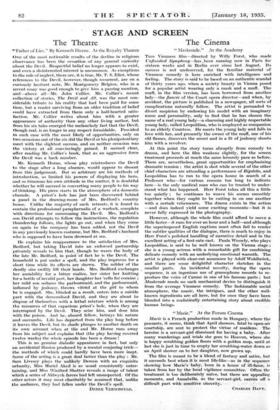The Cinema
" Maskerade." At the Academy This Viennese film—directed' by Willy Forst, who made Unfinished Symphony—has , been running now in Paris for sixteen weeks and in' Berlin ever since last August. Its success is not undeserved,- for the familiar material of Viennese comedy is here enriched with intelligence ' and feeling. The story is said to be based on an authentic scandal of thirty years ago, when a society beauty in Vienna posed for a popular artist wearing only a mask and a muff. The muff, in the film version, has been borrowed from another lady—the fiancée of the Court opera director—and when, by accident, the picture is published in a newspaper, all sorts of complications naturally follow. The artist is persuaded to divert suspicion by endowing his model with an imaginary name and personality, only to find that he has chosen the name of a real young lady—a charming and highly respectable young lady, called Leopoldina, who is employed as companion to an elderly Countess. He meets the young lady and falls in love with her, and presently the owner of the muff, one of his old flames, discovers the secret and in a fit of jealousy shoots him with a revolver.
At this point the story turns abruptly from comedy to drama, and here the film weakens slightly, for the screen treatment proceeds at much the same leisurely pace as before. There are, nevertheless, great opportunities for emphasizing dramatic tension ; the artist is shot while several of the other chief characters are attending a performance of Rigoletto, and Leopoldina has to run to the opera house in search of a Professor who—for various reasons too long to indicate here—is the only medical man who can be trusted to under- stand what has happened. Herr Forst takes all this a little too quietly ; he continues to weave his scenes smoothly together when they ought to be cutting in on one another with a certain' vehemence. The drama exists in the action —and does indeed yield some exciting moments—but it is never fully expressed in the photography.
However, although the whole film could afford to move a little faster—it runs for over an hour and a half—and although the superimposed English captions must often fail to render the subtler qualities of the dialogue, there is much to enjoy in Herr Forst's polished handling of narrative detail and in the excellent acting of a first-rate cast. Paula Wessely, who plays Leopoldina, is said to be well known on the Vienna stage ; she is a young actress with a remarkable gift for combining delicate comedy with an underlying emotional warmth. The artist is played with clear-cut assurance by Adolf Wohlbriick, and there are some delightful character sketches in the smaller parts. An incidental novelty, during the opera sequence, is an ingenious use of gramophone records to re- produce the voice of Caruso in one of his famous parts ; but Maskerade needs no such mechanical device to distinguish it from the average Viennese comedy. The fashionable social atmosphere, the music, the intrigues, and the other well- known ingredients are all here, but for once they have been blended into a realistically entertaining story about credible human beings.
•
" Marie." At the Forum Cinema Marie is a French production made in Hungary, where the peasants, it seems, think that April showers, fatal to open-air courtship, are sent to protect the virtue of maidens. The heroine is a servant-girl dismissed for having a baby. After many wanderings and trials she goes to Heaven, where she is happy scrubbing golden floors with a golden mop, until at last she is just in time to empty her scrubbing-water down as an April shower on to her daughter, now grown up.
The film is meant to be a blend of fantasy and satire, but it succeeds best when it is most life-like—as in the sequence 'showing how Marie's - baby, born in a house of ill-fame, is taken from her by the local vigilance committee. Often the treatment is too deliberately naive, but there are appealing moments, •and Annabella, as the servant-girl, carries off a difficult part with sensitive sincerity.
Cl/ARLES DAVY.






































 Previous page
Previous page